#feminist film writing
Explore tagged Tumblr posts
Text
I think I have accidentally become very protective of the story of Snow White.
#listening to the disney animation podcast about some early features#made the mistake of listening to the snow white one involving a conversation with someone who deems herself a feminist#and hoo boy#they were fairer than i expected#but also LET ME AT 'EM!#do you have no appreciation for innocence?#for love?#there is no film nowadays that would value housework as a worthwhile skill the way this one does#and that shouldn't be the only thing women can do#but a lot of women do it!#also this film doesn't need to be commenting on all of society#sometimes you're just telling this one specific story#idk i guess writing my own version of snow white#who is almost comically pure and innocent#makes me appreciate her a lot more and get mad at people who don't#when i have time i need to write a better rant
89 notes
·
View notes
Text
i made a list of my top 100 movies to see in your lifetime; this is 1-25
the full list write-up will be posted after the last quarter 🌟
youtube
#film#writing#feminist film#horror movies#movies#top100#cinema#cinephile#film review#film critic#filmmaker#independent film#art#listicle#Youtube
2 notes
·
View notes
Text
I wonder if I'm the first person to have listened to the audiobook reading of Carol Clover's Men, Women, and Chainsaws while hurtling along in my car at 65 mph while shoving a beef n ched down my gullet
#feminist film theory baby!!!!!#surlrisingly interesting and entertaining so far!!#ill write more thoughts when i have access to a real keyboard#carol clover#men women and chainsaws#cloudy blog
4 notes
·
View notes
Text

#poets on tumblr#queer poets on tumblr#poetrylovers#feminist poetry#spilled ink#women who write#writers and poets#writerscommunity#poetry#queer poetry#spilled words#words words words#spilled poetry#writers on tumblr#pulp fiction#90s#90s films#nineties#quentin tarantino#tarantino film#bauhaus#goth rock#gothic rock#goth music#post punk#peter murphy#haunting#vampire#anxiety attack#borderline personality disorder
2 notes
·
View notes
Text
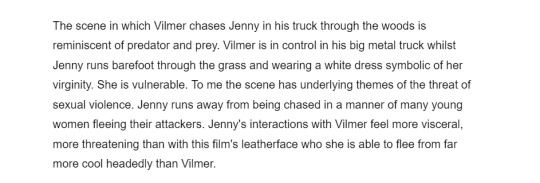
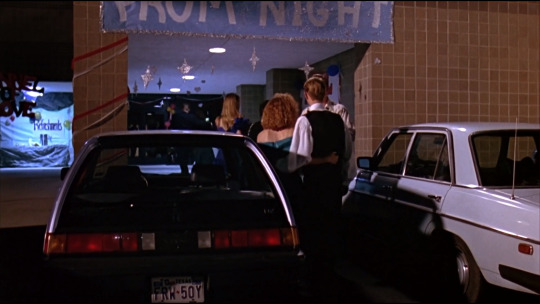


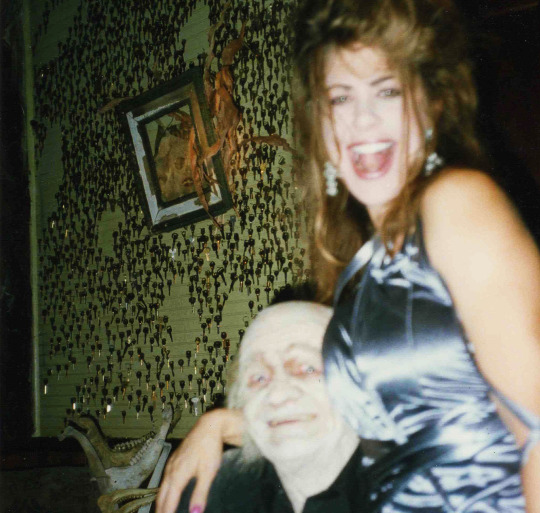
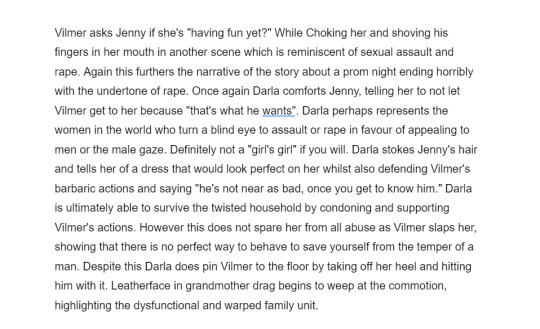

my thoughts on TCM: The Next Generation part2
#my work#feminist writing#feminist reading#Texas Chainsaw Massacre#texas chainsaw massacre the next generation#tcm#tcm the next generation#leatherface#slashers#slasher#slasher film#men women and chainsaws#horror#final girl#finalgirl#final girl syndrome#90s horror#90shorror
23 notes
·
View notes
Text
Hey remember when I mentioned I was trying to find a place to publish my 12 page essay on Bones and All? Well I finally did it and by did it I mean put it in a blog post on medium! I’m linking it below:
#bones and all#bones and all essay#luca guadagnino#bones and all movie#film analysis#meta analysis#cannibalism#essay writing#essay#feminist analysis#queer theory#queer film analysis#postmodernist feminist theory#feminist theory#queer film#eucharist#cannibalism as sex#cannibalism as a metaphor for love#cannibalism as the Eucharist#not not tlt#not tlt
7 notes
·
View notes
Text
i will say that the way poor things handles disability and disfigurement left a bad taste in my mouth
#i saw demi adejuyigbe write abt how it resonated with him through an autistic reading which i do think is cool#but idk something abt how and when we are supposed to empathise with intellectually disabled ppl#i get it i get that its allegorical and what not but idk something abt the only happy ending for disabled ppl#being a miraculous cure or death yknow#i understand it was a child brain and im being literal but idk#just the times that her mannerisms and behaviour earlier in the movie is played for laugh and how her happy ending is being smart#and needing no carers or helpers#so haha fuck you to remy youssef for calling her an ableist slur at the beginning#now shes his boss!!#its just very white and palatable#they would not make a movie like this with a less conventionally attractive lead bc ppl would just be grossed out#bc you can't act the way emma stone acts at the beginning of the film and not be bangable#the story is written around a conventionally attractive woman it wouldn't work if the person casted was less desirable#but tbh that is my problem. not just with this movie just like all of the big 'feminist' adjacent movies & tv shows of late#*played for laughs. look i make typos constantly i am bad at smartphones despite being a part of the smartphone gen
3 notes
·
View notes
Text
Breaking Down the Bold Finale: Why Promising Young Woman Nailed It
Hey, fellow film lovers! Promising Young Woman (2020) is one of my all-time favourite movies and for good reason. It discusses important topics about society and femininity.
Let’s dive into the jaw-dropping finale of Promising Young Woman. Buckle up for a chat about film theory and why that ending is a knockout.
Feminist Film Theory: Power to Cassie
In the realm of feminist film theory, Cassie is our unapologetic protagonist. She emerges as an avenging hero, shattering the conventional narrative. The ending? It had to be bold, reflecting Cassie’s relentless pursuit of justice.
Cassie, portrayed with depth by Carey Mulligan, challenges the typical female character arc. The tension and power dynamics unfold in scenes where she confronts her targets.
The ending becomes a powerful statement. It breaks away from traditional gender norms. The ending also offers a fresh perspective on justice in the face of sexual assault.
Genre Deconstruction: Twisty Turmoil
Now, let’s talk about genre deconstruction. Promising Young Woman begins as a dark comedy. Before long, it morphs into a thrilling tragedy. Why? To keep us on our toes. The ending is unconventional because life itself is messy, and so is this story.
The film’s ability to blend dark comedy with thriller and tragedy is intentional. Shaking up genre expectations makes us question our assumptions about justice and morality. The ending isn’t neatly packaged, but a deliberate departure from the expected.
Visual Language: Colors Speak Louder
Have you noticed those dreamy pastel colours during Cassie’s confrontations? These pallets act as eye candy AND visual storytelling. The ending needed to be a spectacle.
The filmmakers used colours to challenge societal perceptions and scream empowerment. Pastel colours in confrontation scenes add layers of irony. The pallet challenges traditional notions of femininity.
This visual language enhances our understanding of the film’s themes. It adds depth to the ending, making it an interplay of satisfaction AND discomfort.
Dialogue as Subtext: The Unsaid Speaks Volumes
Cassie’s exchanges, especially with characters like Ryan, are dripping with subtext. The coffee shop confrontation? It’s a dialogue masterpiece, wrapping up Cassie’s journey with emotional weight.
Film theory teaches us that dialogue isn’t just about words. It’s also a hidden treasure trove of meaning. We can especially focus on lines leading to the film’s climax.
Let’s talk about THAT line in one of the ending scenes, where Cassie shows up as Candy.
Al Monroe: It’s every man’s worst nightmare, getting accused of something like that.
Cassie: Can you guess what every woman’s worst nightmare is?
Now that’s a kicker.
Al Monroe, played by Chris Lowell, reveals a common sentiment among men. He expresses fear at the thought of a woman accusing him of a heinous act.
Cassie’s retort brings the film’s feminist themes to the forefront. It challenges Al and, by extension, the audience.
Men may fear false accusations, but women live with the constant threat of sexual assault. They face the fear of no one believing them or taking them seriously.
Cassie’s response is a stark reminder of the gendered nature of societal fears. Her line put a spotlight on the systemic issues surrounding sexual assault. These types of lines prompt viewers to confront the disparity in societal expectations.
Cassie’s question is a rhetorical challenge, urging the audience to reconsider their ideas. The line encourages the viewers to empathise with the lived experiences of women. This dialogue lingers, forcing viewers to confront uncomfortable truths about sexual assault.
Catharsis and Disquiet: Emotional Rollercoaster
As we approach the finale, that mix of satisfaction and disquiet isn’t accidental. Film theory says it’s purposeful. The ending brings catharsis, a release, but it also nudges us to question more. It’s a rollercoaster designed to make us think.
The emotional impact of the ending is intentional. It prompts us to reflect on our own expectations and biases. The ending pushes us to confront uncomfortable truths about justice and societal expectations.
The film doesn’t spoon-feed us a tidy resolution. Instead, it leaves us with a cocktail of emotions. It sparks conversations long after the credits roll.
A Cinematic Rebellion
In a nutshell, Promising Young Woman chose its ending for a reason. Feminist film theory empowered Cassie. Genre deconstruction kept us guessing. The visual language uses colours to challenge norms. Dialogue spoke volumes.
The ending delivered catharsis and disquiet, leaving us with thoughts to ponder. This film isn’t just a movie. Promising Young Woman is a conversation starter. This film challenges norms and sparks discussions about justice and revenge for women.
That’s why the ending had to be a spectacle. Promising Young Woman shows a cinematic rebellion against the norm. Through feminist film theory, genre deconstruction, visual language, and dialogue analysis, the film crafts an ending as bold as its protagonist.
#my writing#creativepotatowrites#writeblr#promising young woman#promisingyoungwoman#filmblog#filmessay#movie#film blog#film essay#feminism#feminist theory#film theory
4 notes
·
View notes
Text
she’s a 10 but she has parasocial relationships with disney characters
#was too scared to put this on my main LMAO#but anyway for one of my classes my professor is asking us over the weekend to ponder what it means to be a princess#using the disney princess films as a blueprint#and like due to all the rachel zegler snow white drama she’s creating for herself I’ve seen a lot of people#make really valid arguments in defense of the disney princesses esp the classic ones#so I am even more well equipped to argue a case for them#and there’s this one person in my class who is so annoying and seems like they would probably take on the pseudo-feminist idea of like#the classic princesses being weak bc they seek domesticity or true love#which in most cases is just blatantly not true#anyway I could write a thesis about this topic and I will be exercising some of that argumentative power on Monday if I have to
3 notes
·
View notes
Text
#writing#film criticism#film essay#horror#feminist horror#possession#isabelle adjani#Parker finn#smile
0 notes
Text
Currently reading Chaos by Tom O’Neill. It’s perhaps the only piece of literature that has scared me to my bones. It details the sixties, the CIA, and Charles Manson— but most specifically that there is a great evil lingering among those in power, and many are oftentimes silenced to keep it private. There has always been a connection between crime and corruptive government, but this book… this book!— the detailing of Sharon Tate, the found videotape of Roman Polanski literally forcing her to have sex with men, the diligent people in Hollywood who didn’t dare speak a bad thing about his name— it just feels like a prelude to Jeffrey Epstein. These abuses of power and their consequences are not coincidental. They are intentionally created.
#prose#writing#helter skelter#film#1960s#radfem#spilled ink#literature#black girl#girlblogging#quotes#creative writing#radfeminism#radfemblr#radical feminism#radblr#radical feminists do interact
0 notes
Text
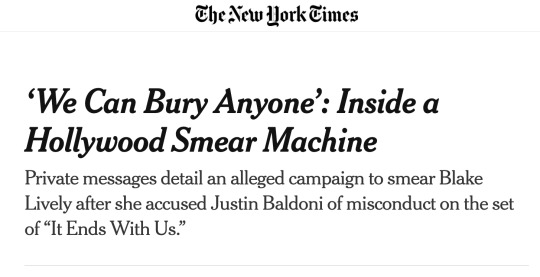
'We Can Bury Anyone': Inside a Hollywood Smear Machine (Megan Twohey and Mike McIntire and Julie Tate, The New York Times, Dec 21 2024)
"Last summer, as the release of “It Ends With Us” approached, Justin Baldoni, the director and a star of the film, and Jamey Heath, the lead producer, hired a crisis public relations expert.
During shooting, Blake Lively, the co-star, had complained that the men had repeatedly violated physical boundaries and made sexual and other inappropriate comments to her.
Their studio, Wayfarer, agreed to provide a full-time intimacy coordinator, bring in an outside producer and put other safeguards on set.
In a side letter to Ms. Lively’s contract, signed by Mr. Heath, the studio also agreed not to retaliate against the actress.
But by August, the two men, who had positioned themselves as feminist allies in the #MeToo era, expressed fears that her allegations would become public and taint them, according to a legal complaint that she filed Friday.
It claims that their P.R. effort had an explicit goal: to harm Ms. Lively’s reputation instead.
Her filing includes excerpts from thousands of pages of text messages and emails that she obtained through a subpoena.
These and other documents were reviewed by The New York Times. (…)
Mr. Baldoni was best known for the CW satirical romantic dramedy “Jane the Virgin.”
Wayfarer provided the resources for bigger ambitions. It was bankrolled by the billionaire Steve Sarowitz, who is co-chair of the studio with Mr. Baldoni.
They and Mr. Heath, the chief executive, are all deeply involved with the Baha’i religious organization, which promotes unity, peace and gender equality.
Mr. Baldoni has presented himself as an ally to women, writing books, co-hosting a podcast with Mr. Heath and giving talks on toxic masculinity. (…)
She claimed Mr. Baldoni had improvised unwanted kissing and discussed his sex life, including encounters in which he said he may not have received consent.
Mr. Heath had shown her a video of his wife naked, she said, and he had watched Ms. Lively in her trailer when she was topless and having body makeup removed, despite her asking him to look away.
She said that both men repeatedly entered her makeup trailer uninvited while she was undressed, including when she was breastfeeding. (…)
As the film release neared, Ms. Lively and other cast members informed Sony and Wayfarer that they would not do any appearances alongside Mr. Baldoni.
So did Ms. Hoover, the author, who had her own dissatisfactions with him and had become more upset after he told her about Ms. Lively’s allegations, according to text messages from Mr. Baldoni and Mr. Heath.
By the first week of August, Wayfarer and Mr. Baldoni had retained Ms. Nathan, who had worked with high-profile clients including Mr. Depp, whose ex-wife, Amber Heard, accused him of physical abuse. (…)
Three days later, Mr. Baldoni texted Ms. Abel, flagging a social media thread that accused another celebrity of bullying behavior and had generated 19 million views. “This is what we would need,” he wrote.
Ms. Nathan soon floated proposals to hire contractors to dominate social media through “full social account take downs,” by starting “threads of theories” and generally working to “change narrative.”
“All of this will be most importantly untraceable,” she wrote. (…)
When Ms. Abel wrote to her Aug. 4 that “I’m having reckless thoughts of wanting to plant pieces this week of how horrible Blake is to work with. Just to get ahead of it,” Ms. Nathan replied that she had spoken off the record to an editor at The Daily Mail.
“She’s ready when we are,” Ms. Nathan wrote.
A flurry of articles followed the Hollywood Reporter piece. Many made it seem as if the only rift was over creative control.
Some journalists had gotten wind of complaints about Mr. Baldoni’s behavior, but none of the most serious ones were published.
“He doesn’t realise how lucky he is right now,” Ms. Nathan texted Ms. Abel. (…)
It is unclear exactly how Mr. Wallace operated.
There are references in emails to “social manipulation” and “proactive fan posting,” and text messages cite efforts to “boost” and “amplify” online content that was favorable to Mr. Baldoni or critical of Ms. Lively.
“We are crushing it on Reddit,” Mr. Wallace told Ms. Nathan, according to a text she sent Ms. Abel on Aug. 9.
The next day, one of Ms. Nathan’s employees texted, “We’ve started to see shift on social, due largely to Jed and his team’s efforts to shift the narrative.”
Ms. Nathan wrote to Ms. Abel: “And socials are really really ramping up. In his favour, she must be furious. It’s actually sad because it just shows you have people really want to hate on women.” (…)
On Aug. 16, Ms. Nathan shared the Daily Mail article headlined “Is Blake Lively set to be CANCELLED?” with references to ‘hard to watch’ videos and a ‘tone deaf’ promotional Q. and A.
“Wow. You really outdid yourself with this piece,” Ms. Abel responded.
“That’s why you hired me right?” Ms. Nathan replied. “I’m the best.”"
3K notes
·
View notes
Text
Truths that Co-Exist
Barbie (2023) is a giant product placement that profits off nostalgia.
The writing is profound and life-changing and understands why we seek nostalgia in a way most nostalgia-driven entertainment doesn’t.
The film is self-aware about how even now, Barbie dolls set incredibly unrealistic beauty standards. Their “body diversity” does not even scratch the surface of what that phrase really means. I don’t expect this to change.
The film still made a beautiful statement with the scene on the bench about how societal beauty standards are narrow and restrictive! And that beauty comes from experiencing life and the marks it leaves on you!
Its feminist statements are validating. Many of us see our reality onscreen, and the great thing is that it includes how cishet men fall down a pipeline of toxic hypermasculinity. It also shows the solution, and allows men to express themselves despite what society expects them to be.
The film is a capitalist venture.
The cast (aside from the leads) and crew were probably overworked and severely underpaid during filmmaking.
We can still appreciate that something fun was made, and we all made another wonderful memory where we and our loved ones went to the movies color-matching in pink.
We should not feel guilty about seeing ourselves in this film.
Meanwhile, support the WGA and SAG-Aftra strike.
#i am kenough#barbie#barbie 2023#i have a lot of thoughts about this film but i had fun#ken#barbenheimer#barbie movie#margot robbie#ryan gosling#i wanted to sob at seeing simu liu having fun onscreen tbh#tears falling like peridots
15K notes
·
View notes
Note
someone described oppenheimer as « tar for the boys » would you agree?
My brother described it as a bunch of men Barbie would commit manslaughter to and I cannot imagine it any other way
#liked the movie btw#but I saw barbie first#seeing a feminist film#that stresses the feminist message#and male ego#you will notice these things#and how insufferable those men might be#especially since Nolan really can’t write women
1 note
·
View note
Text

#feminist poetry#spilled ink#women who write#writerscommunity#writers and poets#queer poets on tumblr#poetrylovers#poets on tumblr#poetry#queer poetry#words words words#suspiria#giallo#italian horror#dario argento#70s horror#italian cinema#soundtrack#film soundtrack
3 notes
·
View notes
Text
well i watched promising young woman for the first time and i hated it
1 note
·
View note